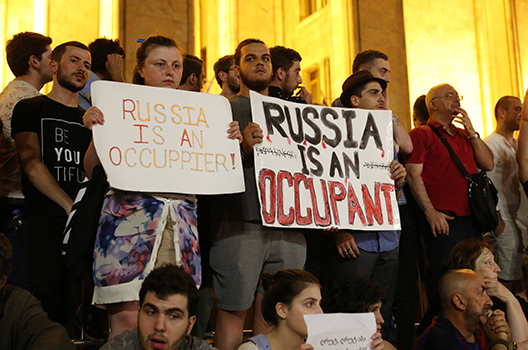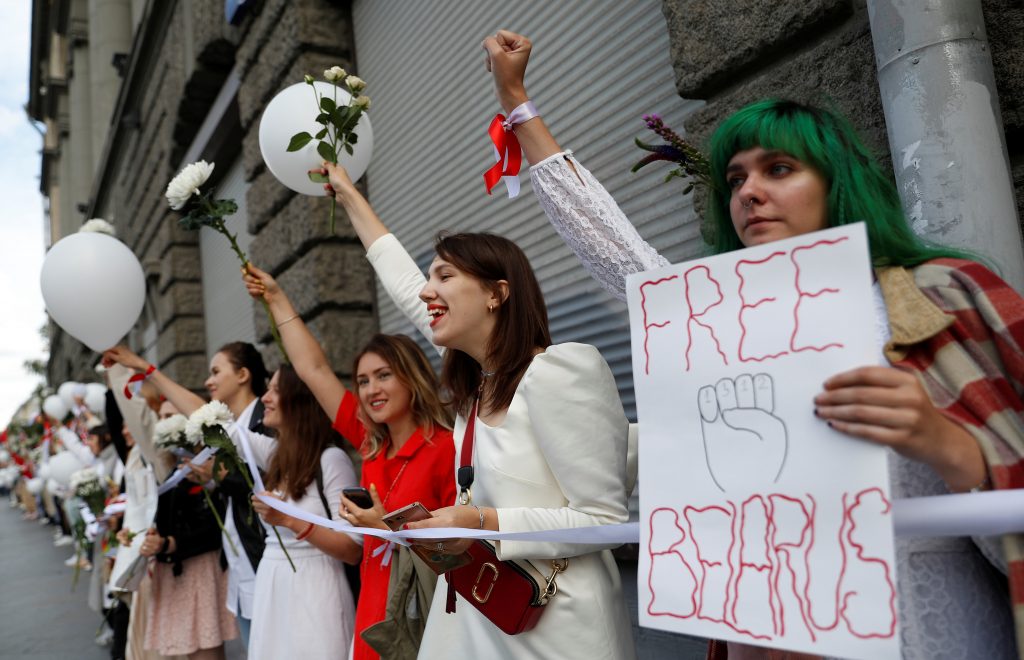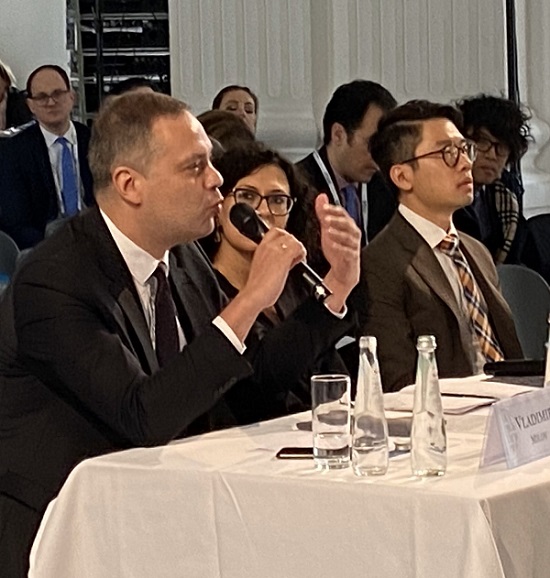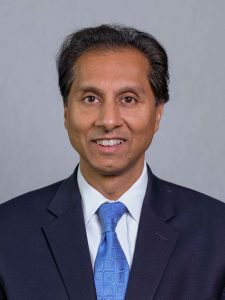Countering Russia’s challenge to the free world
This Issue Brief was prepared for the Free World Commission and was co-authored by Edward Fishman, a nonresident senior fellow in the Eurasia Center, and Ash Jain, senior fellow in the Scowcroft Center for Strategy and Security.
The views expressed in this publication represent those solely of the authors and are not intended to imply any endorsement of the content by members of the Free World Commission.
Executive summary
Over the past decade, the Kremlin has executed a concerted strategy to undermine the cohesion of, and confidence in, democratically-elected governments in Europe and around the world. Vladimir Putin’s determined efforts to maintain his grip on power and resurrect Russia’s great-power status have led him to pursue policies of political pressure, economic coercion, election meddling, and military force to achieve his goals. In response, leading democracies have acted to counter Russia by enacting sanctions and pursuing other measures aimed at defending frontline states against Russian aggression. For these efforts succeed, however, leading democracies will need to demonstrate even greater resolve, utilizing broader elements of their collective national powers, in accordance with a long-term strategic framework. Legislators, in particular, can play a meaningful role in ensuring that national actions are better coordinated across the democratic world. The Free World Commission, which brings together influential legislators from leading democracies, can also help ensure that these measures are coordinated and aligned.
This issue brief sets forth the following goals and corresponding recommendations relating to Russia’s challenge to the free world. First, to ensure that Russia understands that there will be meaningful consequences for its actions, leading democracies should develop a more systematic approach for imposing penalties, including economic sanctions, for future violations of global norms. Second, to help support the democratic aspirations of the Russia people, leading democracies need to adopt more robust and coordinated actions to reach out to Russian civil society and pressure Moscow to respect the political and civil rights of the Russian people. Finally, to maintain unity and succeed over time, leading democracies will need to develop a coordinated, long-term strategy aimed at defending the democratic order from Russia’s attempts to undermine it.
Background
Russia has acted to undermine democratic order across a range of important areas. The first relates to Russia’s use of force to seize control of foreign territory. Putin’s decision to forcibly seize and annex Crimea represents a flagrant violation of international norms protecting sovereignty and territorial integrity. Moscow’s annexation of Crimea appears intended, in part, as retribution for the Ukrainian people’s uprising against pro-Moscow president Viktor Yanukovych. Moscow’s action violated the terms of the Budapest Memorandum and has been met with widespread condemnation, with 100 states voting in favor of a UN General Assembly resolution against Russia’s actions in seizing Crimea.
Secondly, Russia has engaged in deliberate efforts to undercut the political freedom of its neighbors. One of the hallmarks of the rules-based order is that sovereign democracies should be free from outside pressure or coercion in determining their own destiny. However, Moscow has used the presence of Russian-speaking populations in Georgia, Moldova, Ukraine, and the Baltic states as a pretext for interfering in their political affairs. Russia has threatened to cut off trade and disrupt energy supplies to coerce Armenia, Moldova, and Ukraine to join the Eurasian Economic Union, and, according to news reports, plotted to assassinate Montenegro’s prime minister in order to thwart that country’s bid to join NATO.
The third relates to Russia’s meddling in foreign elections.Russia’s unprecedented interference in both the 2016 and 2020 US presidential elections represents a serious affront to democratic norms. As reported by US intelligence and law-enforcement agencies, Russia engaged in a broad covert operation not only to undermine public confidence in the integrity of the US presidential election, but also to influence its outcome. Russian influence operations in Europe—including in Ukraine—may have served as a template for these activities. Concerns are now being raised about Russia’s influence operations to impact upcoming elections in the Netherlands, France, the Czech Republic, and Germany.
Fourth is Russia’s support for autocratic regimes. Russia has established a practice of supporting autocratic regimes around the world, particularly those opposed to the West. Its closest political and military partners are authoritarian governments—Syria, Iran, China, Venezuela, Belarus, and the Central Asian members of the Moscow-based Collective Security Treaty Organization. Moscow has showed support for autocratic regimes by using its veto power at the UN Security Council to block resolutions critical of human rights in states such as Syria, Zimbabwe, and Myanmar. In the case of Syria, Russia has gone so far as to militarily defend the Assad regime from opposition groups. And in Belarus, Russia has backed Aleksandr Lukashenka’s efforts to cling onto power after widespread protests emerged following the rigged election of August 2020.
Fifth, Russia has aided and abetted a range of human rights abuses and has sought to prevent Western-led efforts to hold accountable those involved in war crimes. Moscow has blocked UN actions to refer Syria to the International Criminal Court following the Assad regime’s alleged use of chemical weapons against civilians, assisted Assad in his scorched-earth campaign to regain control of Aleppo, and used bunker-busting and incendiary bombs against the population in Aleppo. Furthermore Moscow prevented the establishment of an international tribunal to hold accountable those involved in the downing of Malaysian Airlines flight MH-17 in eastern Ukraine, an atrocity that killed 298 innocent civilians.
Finally, Russia has continually sought to suppress democracy at home and resorted to violent tactics including political assassinations. Russia’s turn away from democracy at home represents a significant setback for the Russian people and global efforts to promote a rules-based international order. The recent attempt to poison Russian opposition leader Alexei Navalny is but the latest in a series of attempts to eliminate any potential challenge to Putin’s hold on power.

Recent actions by leading democracies
Russia’s actions in each of these areas represent serious and troubling violations of longstanding norms. Viewed as a whole, they suggest that prospects for friendly relations with Russia are dim and that Washington’s efforts should be focused on defending the United States and its allies against Moscow’s aggression. Russia’s strategic aims are directly undermining transatlantic and Indo-Pacific security, and its actions are deeply incongruent with democratic values and interests in advancing a rules-based order.
In response to Russian attempts to undermine the norms of the free world, several leading democracies have acted to counter and punish Russia. Following the invasion of Ukraine, the United States and the European Union responded to Russian actions by enacting sanctions on a range of Russian officials, Putin cronies, and state-owned enterprises. The United States, the EU, and the countries of the G7 collaborated to build this sanctions program from 2014 to 2016.1https://www.atlanticcouncil.org/wp-content/uploads/2020/11/US-Sanctions-Policy-Report-v4-002.pdf Though the program remains in place today, it has remained largely stagnant since Donald Trump entered the White House in 2017, giving the Russian economy time and space to adapt and reducing pressure on the Kremlin.2https://www.washingtonpost.com/opinions/2020/10/13/no-trump-has-not-been-tough-russia/
Actions taken by leading democracies are not limited to countering Russia’s invasion of Ukraine. In the last three years, in fact, leading democracies have coordinated a concerted effort to condemn and punish Russia’s violation of international norms. Here in particular the assassination of Sergei Skripal in England and the attempted assassination of Alexey Navalny stand out as incidents which have galvanized international cooperation. Several nations – France, Germany, the United Kingdom, and Canada – have expelled Russian diplomats in response to Russian poisonings of its own citizens. The United States, in a similar move in 2018, expelled more than 60 Russian diplomats and closed the Russian consulate in San Francisco.
With regard to Russian election meddling, leading democracies have called on Russia to stop its interference. US intelligence agencies have expressed concerns about Russian interference in US elections, and European leaders have been outspoken in expressing their concerns about Russian interference in democratic elections. A recent EU report asserted that Russia had conducted a “continued and sustained” disinformation campaign against Europe’s recent parliamentary elections in 2019.3https://www.washingtonpost.com/technology/2019/06/14/eu-russians-interfered-our-elections-too/d In 2018, the Canadian parliament adopted legislation aimed at preventing Russian interference in the Canadian election process with new regulations on paid political advertisements through online platforms.
Recommendations
To succeed in countering this challenge, leading democracies will need to implement more robust measures to constrain Russia’s ability to challenge the security and the legitimacy of the democratic order, while preserving channels of cooperation on issues of mutual interest.
Coordinate sanctions and other tools to deter Russia from further violations of global norms
The primary goal of US and allied sanctions policy should be to deter Russia from further violations of global norms, including interfering in other countries’ democratic processes. To achieve this deterrence, Russia must understand that there will be serious consequences for its actions—and that leading democracies are prepared to impose and maintain penalties against the Russian government for violating fundamental norms.4https://warontherocks.com/2020/10/make-russia-sanctions-effective-again/ Leading democracies should develop a more systematic approach for imposing penalties, including economic sanctions, for future violations of global norms. This will require regular coordination between leading democracies to agree on additional sanctions options and Russian actions that would trigger their imposition. A matrix of penalties should include economic sanctions on Russian state-owned enterprises, restrictions on the issuance of Russian sovereign debt, and travel bans and asset freezes on select Russian officials and Putin cronies. The goal of such an approach would be to shift from an ad hoc, retaliatory posture to a more proactive one. For example, leading democracies should come together to issue a non-military companion to NATO’s Article 5: a declaratory policy stating that serious interference in any of their democratic processes will be treated as an attack all and result in strong multilateral sanctions.5https://www.cnas.org/publications/commentary/trumps-sanctions-wont-deter-moscow By providing greater clarity, predictability, and certainty regarding the penalties that will be imposed should Russia violate specific global norms, such a policy stands a reasonable chance at affecting Moscow’s calculus.
In addition to deterrence, leading democracies should coordinate sanctions to attempt to achieve discrete policy objectives vis-à-vis Russia, including restoring Ukraine’s control over Donbas, stigmatizing the Kremlin’s human rights abuses, frustrating Moscow’s efforts to interfere in other countries’ democratic processes, and curtailing the modernization and global reach of Russia’s military. To succeed in achieving any of these goals, leading democracies must stand united and commit to a much deeper level of policy coordination on sanctions.
Since sanctions were first imposed, the Kremlin has sought to wait them out, betting that sanctions will eventually be lifted as new leaders emerge and other policy priorities take precedence. Leading democracies should make clear, as a matter of policy, that sanctions will be sustained for ongoing violations of global norms and will not be traded away in exchange for cooperation on separate, unrelated issues. For example, the current sanctions regime against Russia for its aggression in eastern Ukraine should not be eased unless Russia takes verifiable steps to implement the Minsk Agreements.
Support the democratic aspirations of the Russian people — and especially those of rising generations
In the long run, an open and democratic Russia is more likely to support global norms and the rules-based order. Leading democracies should coordinate efforts to support the aspirations of the Russian people for more accountable governance. At a minimum, this requires speaking out regularly in favor of protecting democratic rights and individual liberties. This should be done in both public remarks and in private meetings with Russian officials. Multilateral venues, including the Organization for Security and Cooperation in Europe (OSCE) and the Council of Europe, should be strengthened to increase pressure on Putin to restore political and civil rights for the Russian people—including those set forth in the Russian constitution itself.6Constitution of the Russian Federation, Article 17-64, 2001, http://www.constitution.ru/en/10003000-03.htm.
Direct assistance to Russian NGOs may be difficult in today’s environment—and may even be counterproductive, because it could open these groups to allegations of being agents of the West. However, other means to engage and communicate with the Russian public and encourage greater people-to-people contacts should be expanded—including via social media, foreign-student scholarships, research fellowships, and private-sector interaction. The United States and other leading democracies should make it easier for young Russians to visit and study in the West so that they can make up their own minds about the desirability of democracy and civil liberties.7https://www.foreignaffairs.com/articles/russian-federation/2020-06-09/pinning-down-putin During the Cold War, the Helsinki Process provided a legitimate means for top US and Western officials to meet with dissidents in the Soviet Union and Warsaw Pact nations—meetings that many dissidents have cited as instrumental in their ability to promote democratic change. Building on this precedent, high level officials from leading democracies should make a point of meeting with opposition figures as a regular feature of their diplomatic engagements in Russia.

Develop a coordinated long-term strategy toward Russia
For the last 30 years, many democratic leaders have been tempted to seek quick and dramatic improvements in relations with Russia. The repeated failure of these efforts is not a coincidence; the fact is that Putin has determined it is not in his interest to have friendly relations with the West. As a result, it is critical for democratic leaders to be patient—to accept the limitations of current relations with Russia, defend themselves against Moscow’s aggression, and prepare for a future in which Putin is no longer on the scene and there will be a more viable opportunity to reshape relations with Russia.8https://www.atlanticcouncil.org/in-depth-research-reports/report/russia-in-the-world/
Maintaining democratic unity is the critical ingredient to pursuing such a disciplined, long-term strategy. And maintaining that unity will require much more regular dialogues and concerted efforts at strategic coordination. Collaborative platforms that bring together leading democracies, such as the G7 and the Democracies 10 (D-10), should be used to identify and build support for sustainable strategies and approaches for dealing with Russia.9https://www.foreignaffairs.com/articles/asia/2020-08-03/council-democracies-can-save-multilateralism Leading democracies should continue to collaborate on defense and security issues (primarily through NATO and bilateral consultations) as well as on sanctions, and they should ensure that any proposed policy shifts are carefully coordinated among key allies in Europe and the Indo-Pacific.
The 2016 NATO Summit Warsaw Communique highlights the need to “work together to promote intelligence-sharing.” To encourage common assessments of the Russia challenge, and in particular, Russia’s enhanced activities in the cyber and information domains,10http://www.nato.int/cps/en/natohq/official_texts_133169.htm leading democracies should seek to strengthen intelligence sharing, and to ensure key allies not only in NATO but across North America, Europe, and the Asia-Pacific have access to information about threats and challenges affecting the interests of democratic societies and the rules-based order.11http://atlantic-expedition.org/closer-intelligence-cooperation-not-nato-defense-expenditures-should-be-the-focus-of-transatlantic-security-relations/
Role of the Free World Commission
The Free World Commission is composed of influential legislators from leading democracies committed to defending democracy and advancing a rules-based international order. The Commission includes the foreign affairs committee chairs and/or other influential legislators representing Australia, Canada, Germany, Italy, Japan, the United Kingdom, and the United States, as well as the European Union. The Commission was established by the Atlantic Council with a grant from the National Endowment for Democracy, and conducted its first public hearing at the Munich Security Conference in February 2020. At the hearing, the Commission heard from pro-democracy activists from Hong Kong, Russia, and Iran. Russian opposition leader Vladimir Milov, spoke before the Commission regarding Putin’s crackdown on pro-democracy forces in Russia.
The Free World Commission can play an important role in helping to coordinate the passage and implementation of legislative actions regarding Russia’s challenge to the rules-based democratic order. This could include introducing parallel measures in their respective parliaments to ensure that collective action is taken by governments. Through coordinating joint statements and legislative actions, Commission members can demonstrate democratic solidarity regarding Russia and collectively increase the costs to the Kremlin for undermining fundamental norms.

Annex
Recent policies and actions by leading democracies in response to Russia
Human rights abuses
- Under Executive Order 13818, issued December 20, 2017, the United States sanctioned two Russians for human rights abuses pursuant to the Global Magnitsky Human Rights Accountability Act of 2016.
- In 2018, the United States triggered the Chemical and Biological Weapons Control and Warfare Elimination Act of 1991 in response to the Russian assassination of Sergei Skripal.
- On March 15, 2018, leaders of the United States, France, Germany, and the United Kingdom issued a joint statement condemning the poisoning of Sergei Skripal.
- On March 19, 2018, the Canadian parliament unanimously adopted a resolution Condemning the Russian poisoning of Alexey Navalny.
- On March 26, 2018, the United States expelled more than 60 Russian officials and closed the Russian consulate in San Francisco in response to the poisoning of Sergei Skripal.
- On March 26, 2018, the United Kingdom expelled 23 Russian diplomats in response to the poisoning of Sergei Skripal.
- On March 26, 2018, Italy expelled 2 Russian diplomats in response to the poisoning of Sergei Skripal.
- On March 30, 2018, France expelled four Russian diplomats in response to the poisoning of Sergei Skripal.
- On December 4, 2019, Germany expelled several Russian diplomats in response to a murder in Berlin.
- On September 2, 2020, the Canadian Minister of Foreign Affairs Condemned the Russian poisoning of Alexey Navalny.
- On September 8, 2020, Canada, France, Germany, Italy, Japan, the United Kingdom and the United States released a joint statement condemning the poisoning of Alexei Navalny.
- France and Germany announced on October 7, 2020 that they would propose European Union sanctions on Russia for the poisoning of Alexey Navalny.
- On September 23, 2020, the Congress of the United States condemned the poisoning of Alexei Navalny.
Other actions
- On August 2, 2017, the US Congress passed the Countering America’s Adversaries through Sanctions Act.
- On December 13, 2018, Canada enacted an Act to Amend the Canada Elections Act and Other Acts in response to a perceived Russian attempt to meddle in Canadian elections.
- In response to Russian plans for an energy export pipeline through Germany or Turkey, the Congress of the United States passed the Protecting Europe’s Energy Security Act of 2019.
- On June 18, 2020 the European Council announced that it would extend trade restrictions on Crimea and Sevastopol through June of 2021.
- On October 19, 2020, the United States indicted six Russian military officers in connection with worldwide cyber-attacks.
Image: MOSCOW, RUSSIA- Russian President Vladimir Putin held a video conference on the ecological situation in the city of Usolye-Sibirskoye, Irkutsk region in Moscow, Russia on July 30, 2020.

